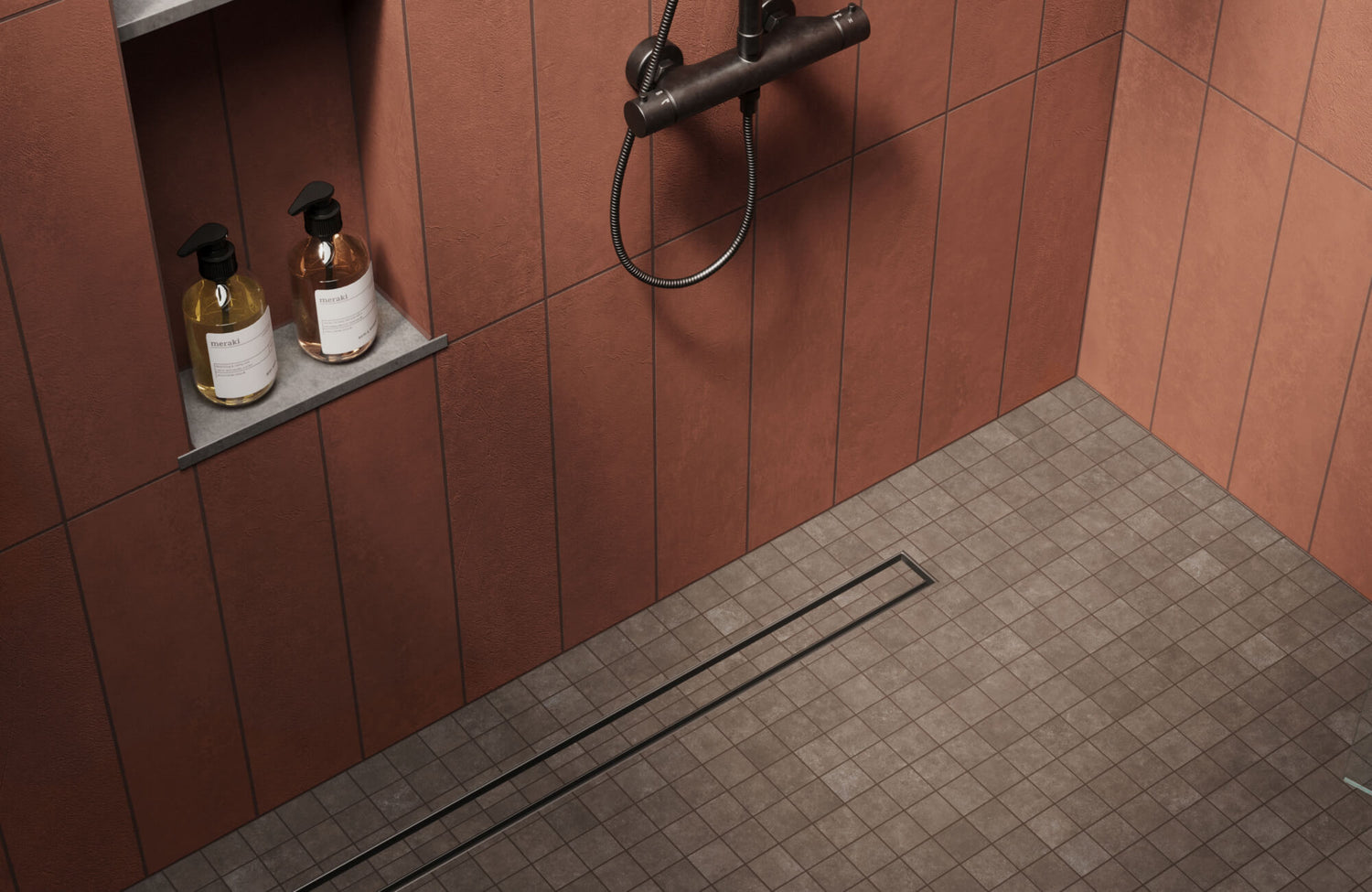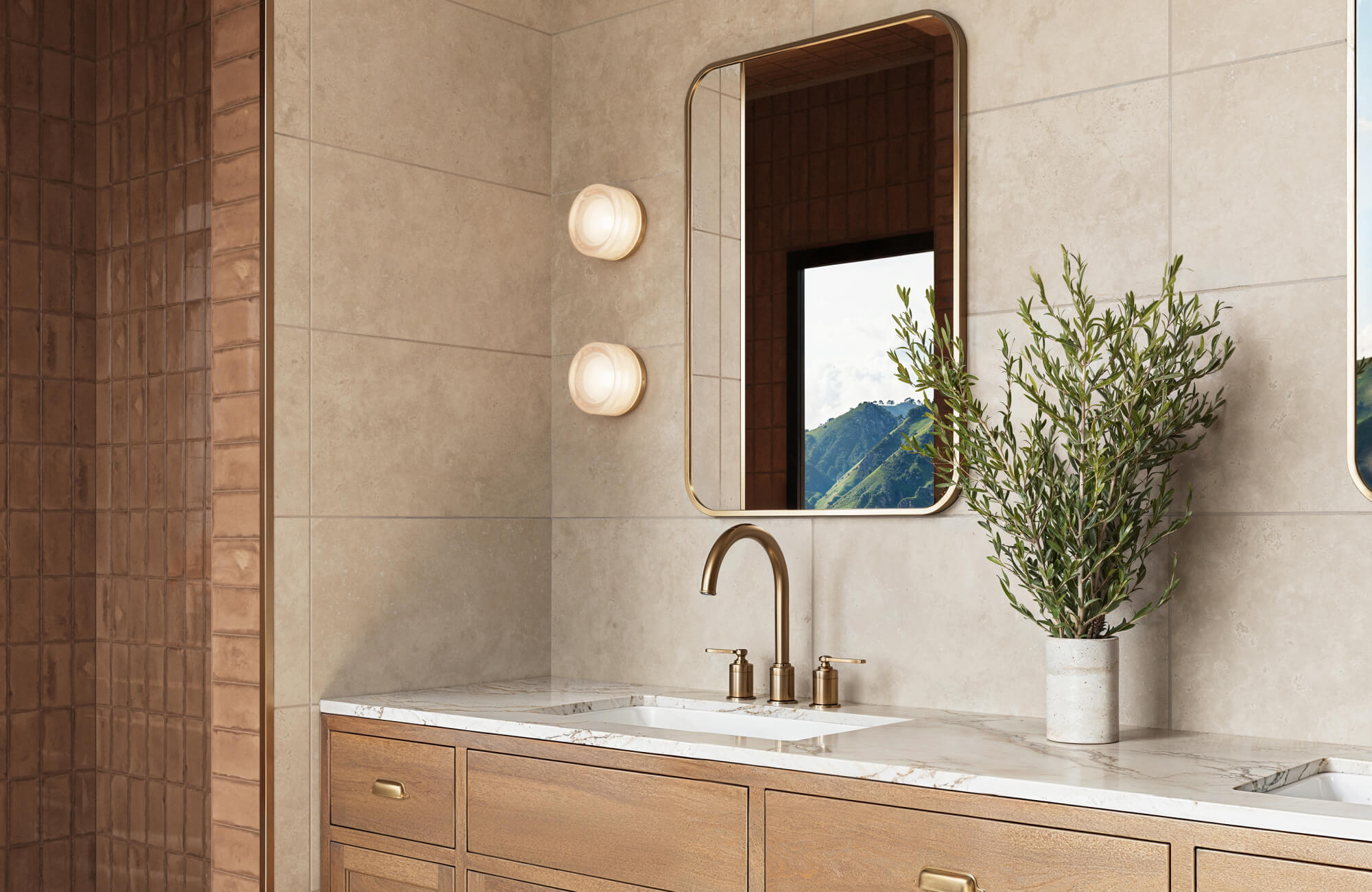Mosaic tiles have grown in popularity in contemporary bathroom design, attracting homeowners seeking a perfect balance of aesthetic appeal and functionality. Mosaic tiles, with their intricate designs and versatility, can dramatically improve the appearance of any shower space, making for a captivating visual impact. These tiles, which come in a variety of colors, patterns, and materials, also provide limitless customization options to suit a wide range of styles, from sleek modern to timeless classics.
In this guide, we will look at the key benefits and considerations for using mosaic tiles in shower areas, compare them to other tile options, and share important installation tips to help you decide if mosaic tiles are the best solution for your shower space.

Benefits of Using Mosaic Tiles in Showers
Mosaic tiles add a unique touch to showers, with textures and patterns that transform plain walls into eye-catching design elements. With options like the Leona 3x3 Matte Porcelain Hexagon Mosaic Tile in Calacatta, as shown in the image above, you can achieve a refined marble look with a matte finish that is both luxurious and inviting. This tile's non-slip surface makes it ideal for shower floors, ensuring safety without sacrificing style.
The color and material variety of mosaic tiles also allow for an infinite number of design possibilities. For example, the Aniston 2x2 Matte Porcelain Hexagon Mosaic Tile in Calacatta Cremo shown in the image below combines a classic hexagonal shape with Calacatta Cremo-inspired veining, adding a touch of elegance that pairs well with other bathroom elements. This tile can work well as a tub surround, as a non-slip surface for shower floors, or even as a feature panel within the shower niche for a refined focal point.
Ultimately, mosaic tiles are ideal for personalizing your shower, as they allow you to mix and match colors and materials to create one-of-a-kind accents and designs. These tiles allow you to express your style with intricate borders or a standout focal point.

Practical Considerations
When choosing mosaic tiles for your shower area, practical factors such as slip resistance, durability, and maintenance are critical in ensuring safety and longevity. Understanding these factors will allow you to make an informed decision that balances aesthetics and functionality.
Longevity and Resistance to Water Damage
Mosaic tiles are well-known for their durability, though this can vary depending on the materials used. Porcelain, for example, is highly resistant to water and wear, making it ideal to use in showers. In contrast, some natural stones, while beautiful, are more susceptible to water infiltration and may require sealing to maintain their integrity. That is why it is critical to choose tiles designed for wet environments that can withstand the rigors of daily use.
Options for Non-Slip Surfaces
Slip resistance is essential in a shower environment to avoid accidents, and many mosaic tiles have textured surfaces to improve grip. Matte finishes, for instance, can provide more traction than glossy finishes, making them safer for wet areas. Mosaic tiles are also especially suitable for shower floors because of their increased grout lines, which improve slip resistance. While no tile can guarantee complete slip resistance, choosing tiles specifically designed for wet areas can significantly reduce risks. Just remember to always check the slip resistance rating before purchasing to ensure you get tiles that are appropriate for your needs.
Ease of Cleaning and Upkeep
Maintaining mosaic tiles is typically simple, but the ease of cleaning varies depending on the materials and grout used. Ceramic and porcelain mosaics are typically easier to clean and less prone to staining, whereas certain natural stones may require more effort to maintain their pristine appearance. Using high-quality, stain-resistant grout can also make maintenance easier by reducing the possibility of discoloration over time. To keep your tiles in top condition, always follow the manufacturer's cleaning recommendations.

Installation Tips
Proper installation is essential for creating a beautiful and functional mosaic tile shower. Paying attention to surface preparation, grouting, sealing, and deciding between professional or DIY installation will ensure your project's longevity.
Ensuring a Smooth and Waterproof Base
Before laying your mosaic tiles, the surface must be thoroughly prepared to ensure a smooth and waterproof base. Begin by ensuring that the substrate is clean, level, and free of any debris or imperfections. For showers, a cement backer board is recommended because it is moisture-resistant and stable. Plus, using a waterproof membrane can help protect your installation from water damage, making it more durable and dependable.
Importance of Using the Right Materials
Choosing the proper grout and sealant is critical for preserving the integrity of your mosaic tiles. Epoxy grout is an excellent choice for wet areas because it is water-resistant and stain-resistant. If you choose cement-based grout, make sure it is properly sealed to avoid moisture penetration, which can lead to mold growth and discoloration. To get the best results, always follow the manufacturer's application and curing time instructions.
Professional vs. DIY Installation
Choosing between professional installation and DIY can have a significant impact on the quality and longevity of your mosaic tile shower. While a professional installer brings expertise and experience to ensure a flawless finish, DIY allows for cost savings and creative expression. However, you should be aware of your skill level and the complexity of the installation, as improper techniques can result in costly mistakes. If you decide to go the DIY route, thorough research and planning are essential for success.
If you want to see how the right mosaic tile can transform your shower space, try our augmented reality (AR) tool to view different colors and finishes in real-time. It’s a fantastic way to test various options and visualize how each tile choice will enhance your bathroom design before making a final decision.
Comparing Mosaic Tiles to Other Shower Tile Options
When choosing tiles for your shower, you must compare mosaic tiles to other materials to determine the best fit for your design and functional requirements. Each type of tile has distinct advantages and disadvantages that can influence your choice based on aesthetics, maintenance, and longevity.
Glass Tiles
Glass tiles have a sleek and modern look, reflecting light beautifully and giving the illusion of more space in the shower. While they can be beautiful, practical considerations come into play, as glass tiles are more prone to chipping and must be handled carefully during installation. They also frequently necessitate the use of specialized adhesives and grouting techniques, which can complicate the installation process. If you're thinking about glass tiles for their aesthetic appeal, make sure to consult with a professional to ensure proper installation and maintenance.
Natural Stone Tiles
Natural stone tiles, such as marble and travertine, add outstanding style and timeless beauty to shower areas. They do, however, require special maintenance because they are more porous than other options and are prone to staining and moisture damage. As previously highlighted, regular sealing is required to maintain their appearance and durability, which can be an added burden for homeowners. While natural stone has a unique and luxurious appearance, those who choose this option should be prepared to invest in additional maintenance to keep it looking its best.
Potential Drawbacks of Mosaic Tiles
While mosaic tiles offer many benefits, it's important to consider their potential drawbacks to make an informed decision for your shower. Understanding the costs, installation complexities, and durability can help you weigh the overall value of using mosaic tiles in your bathroom design.
Less Economical
The cost of mosaic tiles varies greatly depending on the specific materials used and the complexity of the patterns, with unique designs driving prices even higher. When budgeting for your project, it's important to consider not only the cost of the mosaic tiles but also the possibility of specialized installation techniques, which can raise overall costs.
Higher Labor Cost and Effort
Installation of mosaic tiles can be time-consuming and labor-intensive, especially if you choose intricate patterns or designs. Unlike larger tiles, which are easier to install, mosaics frequently necessitate more precise cutting and placement, resulting in longer installation times. For instance, if you decide to hire a professional installer, the extra effort may result in higher labor costs. However, if you're considering a DIY approach, be prepared for the meticulous work required, as mistakes in a mosaic layout can be difficult to correct.
Risks of Chipping and Cracking
Mosaic tiles, especially those made of glass or certain natural stones, can be more fragile than those crafted from ceramic or porcelain, raising concerns about chipping and cracking over time. While they are designed to withstand normal wear and tear, impacts from hard objects or improper installation can cause damage. To reduce the risk of fragility, you can use high-quality materials and exercise caution during installation. Consider also the overall use of your shower area; if it's an area frequently used, choosing more durable tile options may be wise.
Making Your Choice
Mosaic tiles are an excellent choice for shower areas because they have a unique aesthetic appeal, come in a variety of materials, and can be customized. Their ability to improve the visual impact of your space makes them a popular choice for homeowners seeking both style and functionality. However, when making your decision, you must consider costs, installation complexity, and the possibility of fragility.
When choosing mosaic tiles, look for high-quality materials such as porcelain to ensure durability and moisture resistance. Additionally, consulting with a professional installer can help ensure that your tiles are properly laid and will stand the test of time. Ultimately, if you value design flexibility and are willing to invest in the right products and installation, mosaic tiles can turn your shower into a beautiful and functional space. For any questions or personalized guidance, don’t hesitate to contact us! Our team is here to assist you through each step of your tile selection and installation, helping you achieve the perfect style and durability for your shower space.









